Introduction
It often feels that things are going especially bad for us.
In contrast, others around us seem to have perfect sailing.
News flash: most of us are in the same boat.
The good news is that there is a way to shift perspective. To see the opportunities our experiences bring, in the long run.
The key is to strengthen our mental fitness—by embracing our “sage powers” and weeding out the “self-saboteurs” that hold us back.
- Why are we talking about mental fitness?
- What is mental fitness?
- Why do we need mental fitness?
- Is reading the book enough for someone looking to become mentally fit?
- What are self-saboteurs?
- How can you identify your self-saboteurs?
- What are sage powers?
- How can you grow your sage powers and tame the saboteurs?
Why Are We Talking About Mental Fitness?
Axelerant Performance Coach Shalini Singh recently chose mental fitness as her growth webinar topic.
After the first session, it was clear that team members were interested in enhancing their mental fitness. So two more sessions had to be arranged.
Attended a session on 'Mental Fitness—from self-sabotage to self-mastery' by our Performance Coach Shalini Singh. Sharing some great learnings and am proud to be a part of @axelerant which cares about the mental health of its people.#teamaxelerant #lifeataxelerant pic.twitter.com/NLFRKh5vHx
— Nikita Jain (@Nikita_JN) October 21, 2022
Mental fitness is not an oft-discussed subject in the workspace. But more people must talk about it.
Our work mostly has to do with the mind. And common sense dictates that our minds should be fit to handle the pressures of adult life, made more complex by events beyond our control.
According to a World Health Organization (WHO) report, an estimated 12 billion working days are lost to depression and anxiety, and USD 1 trillion in lost productivity annually.
At Axelerant, we want people to have the tools to overcome negative emotions, like stress and fear, in challenging situations.
And with time, transform those situations into empowering and rewarding experiences.
What Is Mental Fitness?
It's all about our level of control over our mental state and how we feel about and perceive our daily experiences.
How happy, fulfilled, and relaxed do we feel in our lives?
Do negative emotions like fear, shame, and frustration drive us? Fear of losing what we have, the shame of being lesser than others, the frustration of doing things without joy.
After trying out the concepts and training modules, Shalini crafted the sessions based on the book Positive Intelligence by Shirzad Chamine.
The author's research shows that most people actively self-sabotages three aspects of their life:
- Relationships
- Effectiveness and performance
- Wellness and happiness
And it is well within our power and control to alter these sabotaging behaviors.
Why Do We Need Mental Fitness?
This question came up in the session, too.
And most people shared the following reasons (or similar versions):
- To feel tranquil and peaceful
- To be able to deal with problems better
- To feel happier
- To have better and lasting relationships
- To feel positive emotions more frequently and for longer periods
- To be more effective and productive at work
- To feel less stressed
- To reach set goals without procrastinating
The reasons indeed fall under the three categories of self-sabotage mentioned in the book.
Attended monthly webinar session on 'Positive Intelligence' at @axelerant 🔥
— Ankush Jain (@ankushJain2103) September 21, 2022
Thanks Shalini Singh for this Insightful session and enlighting us on 'Mental Fitness from self sabotage to self mastery' 💯
STOP 🛑 Saboteurs mode and ACTIVATE Sage mode 💡💪#LifeAtAxelerant pic.twitter.com/wzdnJFOdzs
Is Reading The Book Enough For Someone Looking To Become Mentally Fit?
Reading Shirzad's book Positive Intelligence can provide valuable knowledge about the concept, strategies, and exercises for improving mental fitness.
But the whole purpose of Axelerant's Coaching team is to support people to become better versions of themselves.
And encouraging people to read the book—using the continuing education allowance—is only the first step.
Shalini introduced batches of Axelerant team members to the Positive Intelligence (PQ) program as the next step in bringing mental fitness practices to life.

She walks team members through the program modules as a coach and practitioner, charging the course with support and accountability.
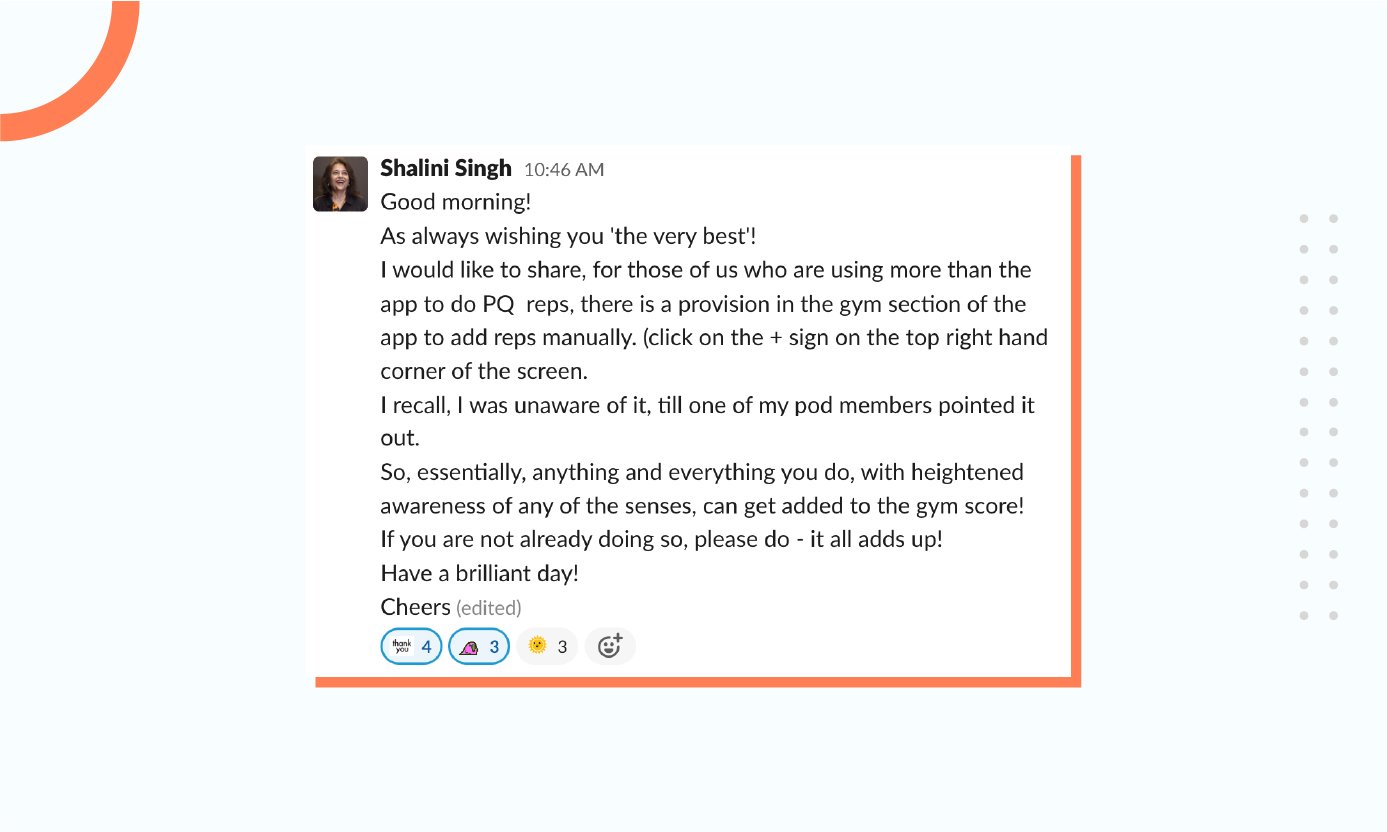
The program provides a more structured and guided approach to implementing positive intelligence principles and exercises in daily life.
What Exactly Are Self-Saboteurs?
According to the book, our saboteurs were our strengths at some point. Like the fear of pain had kept us from harm in many scenarios.
These behavioral patterns that served and helped us survive growing up may not be needed as much as we have gotten used to them.
They motivate us to succeed through negative emotions: fear, anger, shame, insecurity, guilt, etc.
These emotions might bring us success. But not happiness and fulfillment.
We all have these saboteurs to varying degrees, creating a feeling of stress, fear, anxiety, etc. Making life feel miserable.
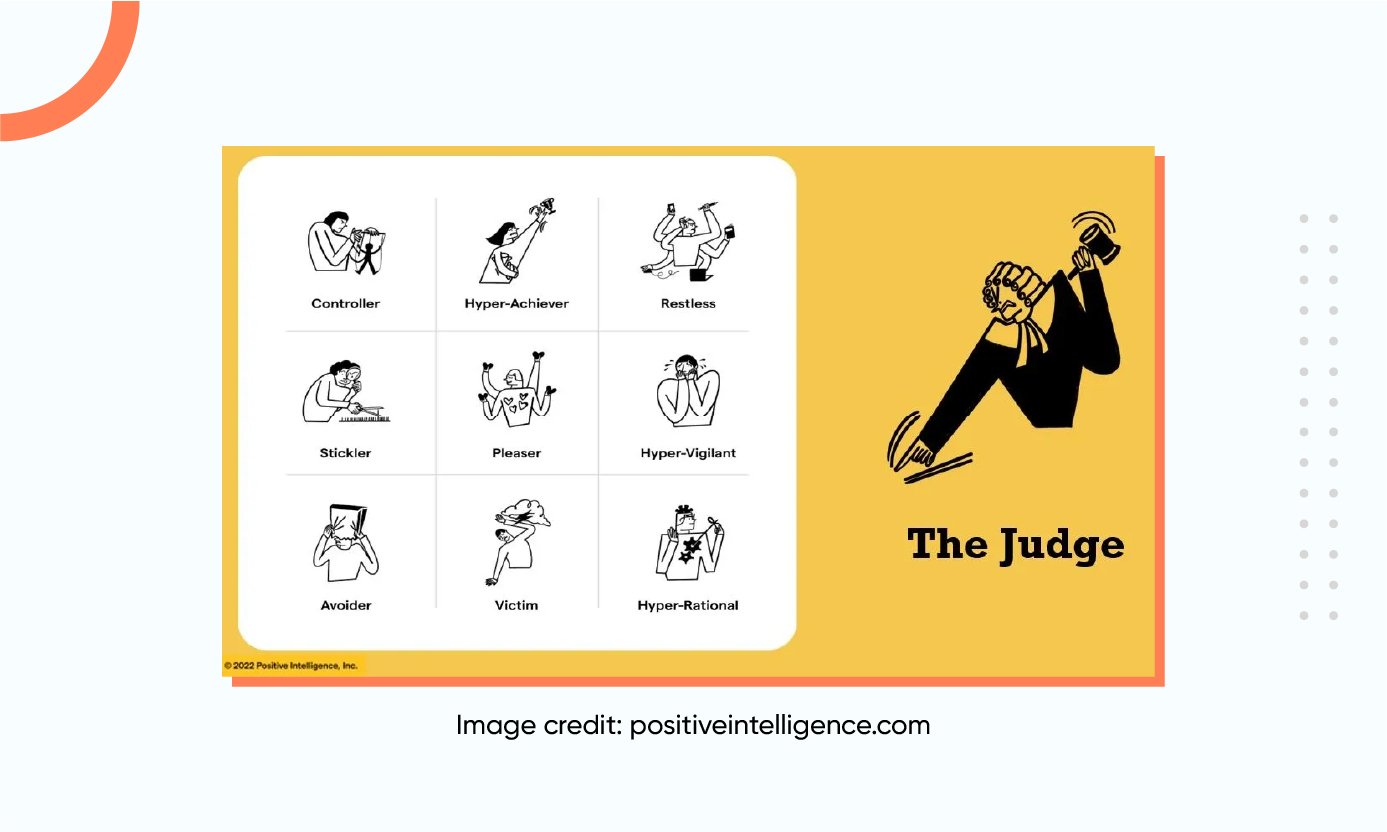
The Judge
The Judge is the inner critic that constantly finds faults and criticizes oneself, others, and situations. It creates self-doubt, feelings of inadequacy, and harsh judgment.
The Judge controls the mind with nine accomplice saboteurs.
The Controller
The Controller is the need for control and perfection. It can lead to rigidity, micromanaging, and difficulty delegating or trusting others.
The Victim
The Victim mentality is a tendency to feel helpless, victimized, and overwhelmed by circumstances. It can lead to passivity, blaming others, and a lack of personal responsibility.
The Avoider
The Avoider tries to escape or avoid uncomfortable or challenging situations. It can manifest as procrastination, distraction, or seeking short-term pleasures to avoid facing complex tasks or emotions.
The Hyper-Vigilant
The Hyper-Vigilant tends to be highly alert in searching for threats, errors, or mistakes in oneself and others. It operates from a fear-based perspective, always anticipating adverse outcomes or worst-case scenarios. It makes one focused on avoiding errors, seeking perfection, and overanalyzing situations.
The Hyper-Achiever
A relentless pursuit of success and external validation drives the Hyper-Achiever. It can lead to burnout, workaholism, and neglect of other important aspects of life.
The Hyper-Rational
The Hyper-Rational overvalues logic and dismisses emotions. It can lead to difficulty connecting with others emotionally and ignoring one's emotional needs.
The Pleaser
The Pleaser seeks approval and validation from others. It can result in excessive people-pleasing, putting others' needs above one's own, and feeling resentful or overwhelmed.
The Restless
The Restless self-saboteur struggles with being present and constantly seeks external stimulation. It can lead to a lack of focus and difficulty in feeling content.
The Stickler
The Stickler fixates on details, rules, and perfection. It can create a rigid mindset, fear of making mistakes, and being overly critical of oneself and others.
How Can You Identify Your Self-Saboteurs?
Our mind is like a battleground for the negative self-saboteurs and the positive sage powers.
It's a matter of peeking in deep to realize which emotions influence our minds and for how long.
A good starting point to recognize which of these nine saboteurs hijack our minds is taking Shirzad's self-saboteur assessment test.
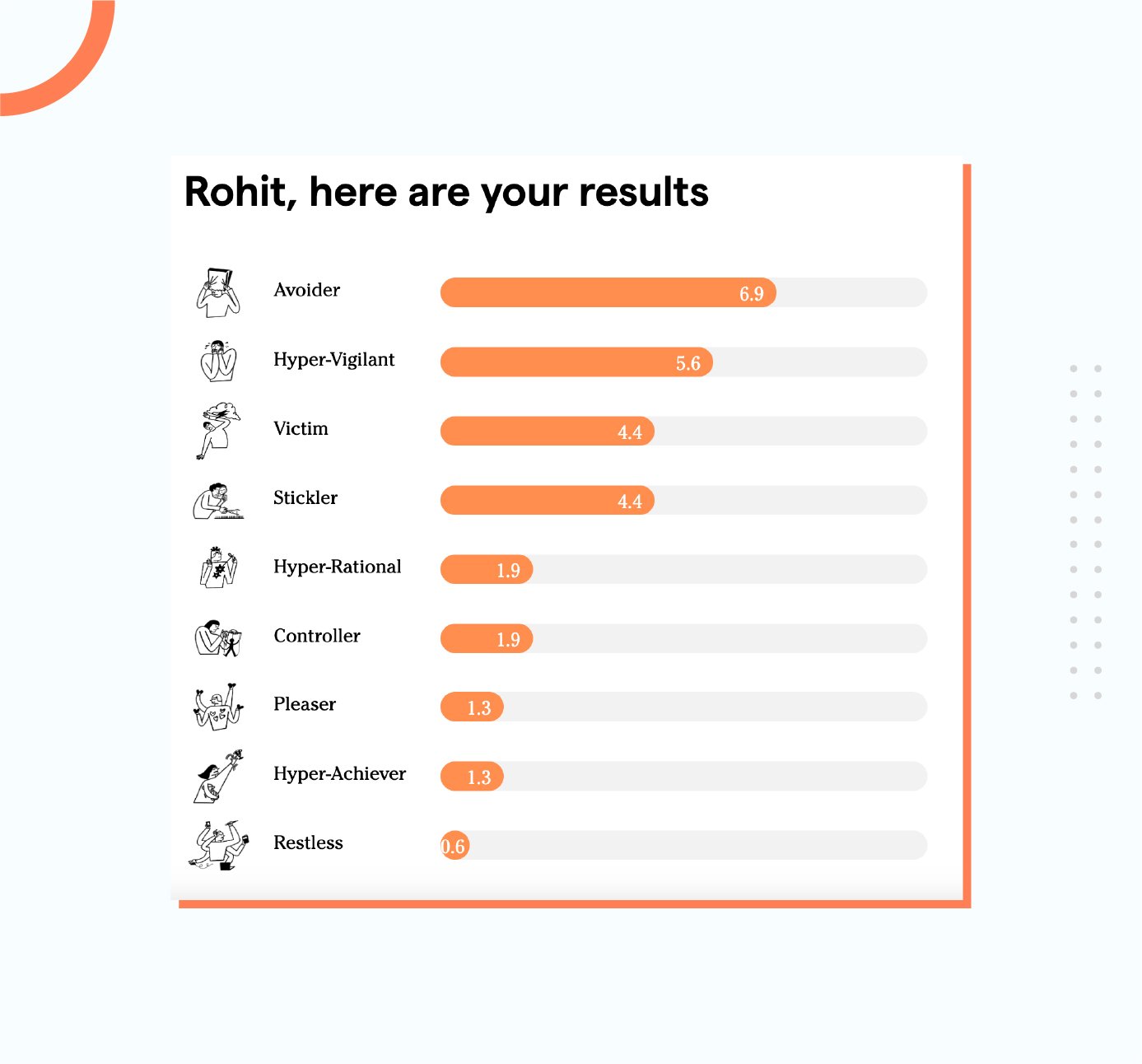
The test's results will tell you which negative voices in your mind block your road to self-mastery.
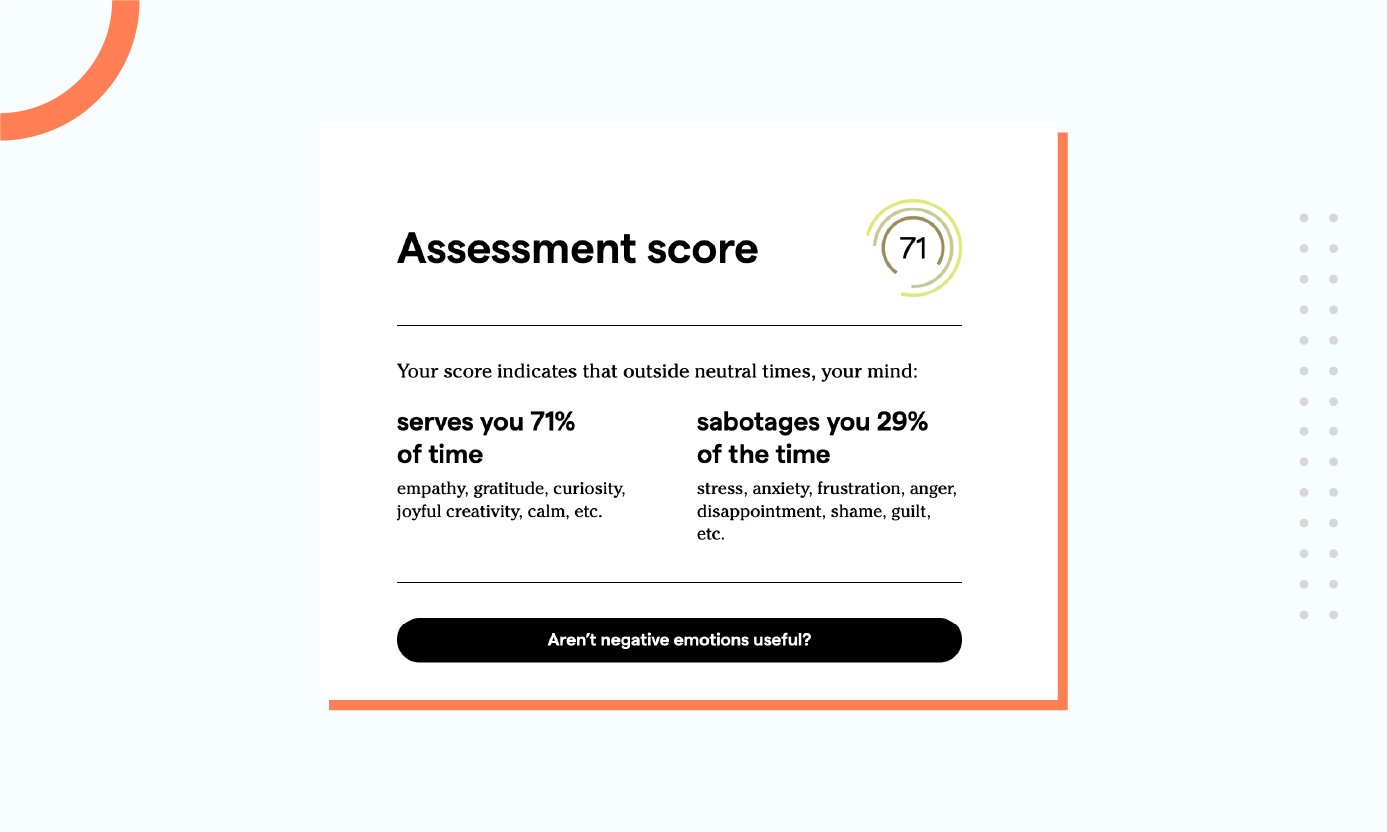
Once you know your top saboteurs, you can develop the ability to stop your mind from getting hijacked—by calling them out in real-time.
What Are Sage Powers?
If self-saboteurs hamper our mental fitness and well-being, sage powers do the opposite.
The choice is ours: which part of the brain we want to operate from.
The situations will remain the same, whether dealing with hard feedback at work or being ambushed by your child's class teacher in a parent-teacher meeting.
The choice of how we want to respond to these situations—using our saboteurs or the sage mind—will determine our state of happiness.
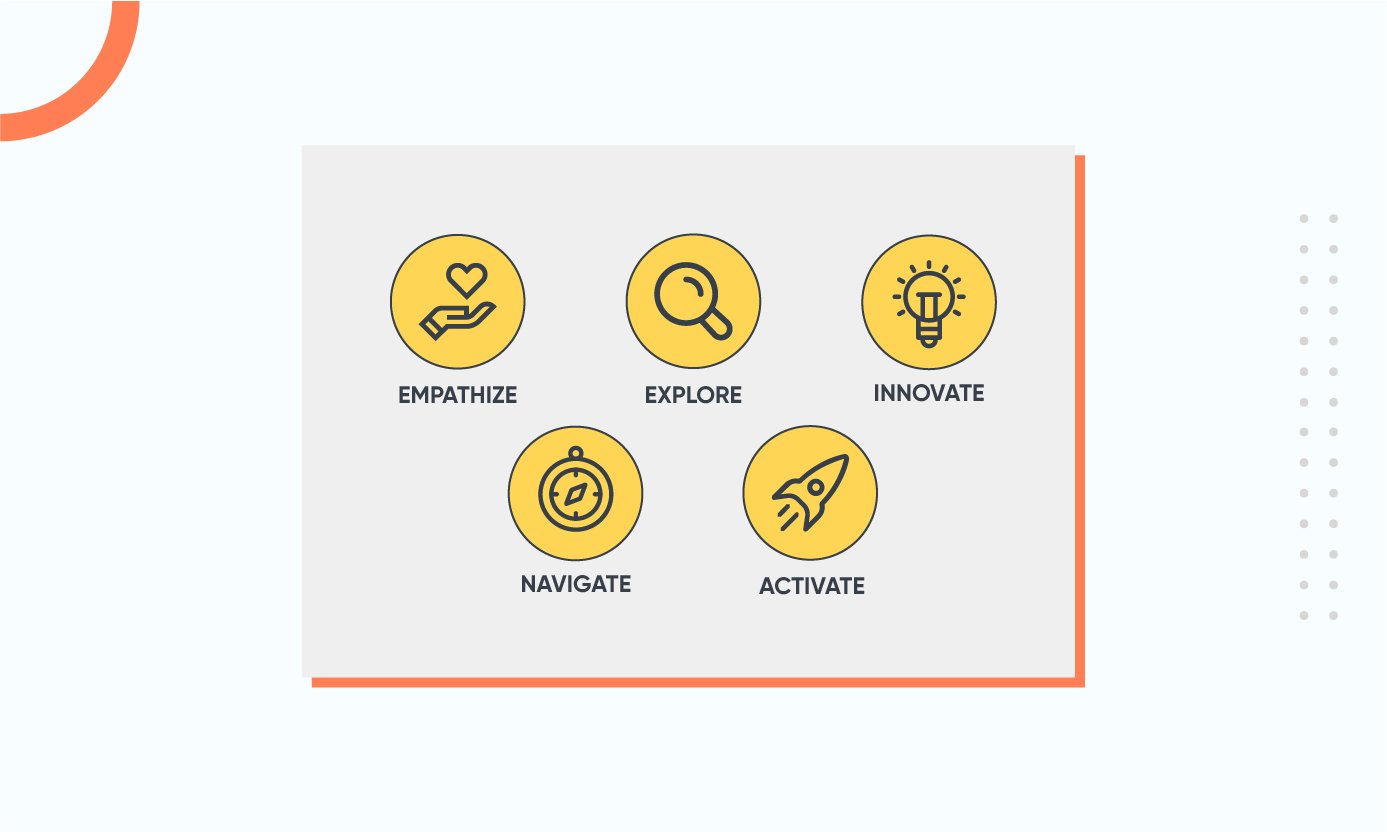
Our sage powers motivate us through curiosity, calmness, empathy, innovation, passion, and purpose.
There are chiefly five sage superpowers that all of us have at our disposal.
Empathize
Choosing empathy for others and oneself. Making a conscious effort to understand where someone is coming from.
A good exercise to self-empathize is visualizing the child you once were: so awesome, so full of love and joy. With a pure essence.
Grab a childhood picture and feel love for that innocent little soul—bubbling with life and curiosity.
Empathizing isn't easy when anger, fear, or frustration poisons the mind.
But when we choose to understand people or ourselves, it allows us to listen genuinely, be present, and show compassion.
Consequently, we gain the ability to be kinder to ourselves and to others.

Explore
Put that down.
What's the matter with you?
You'll break it. Leave it be.
We all have heard these sentences while growing up.
Children break, tangle, poke at, turn, twist, and do all sorts of things when they discover something interesting.
As we grow up, our saboteurs discourage us from exploring like we once did as children.
The saboteur voice in our head says: stick to what's known and comfortable.
But the power to explore is about embracing curiosity, openness, and a growth mindset.
These same traits help us adapt to change, innovate, learn from our mistakes, and expand our potential.

Innovate
There's scope for innovation in every situation and task.
Choosing to be creative and do things in novel ways takes guts. The people around you may not like your shaking the boat.
Your saboteur might constantly make you believe that your ideas are silly. Not worth bringing out into the world.
Write down as many solutions as possible without evaluating them for 10-15 minutes for any given problem or challenge.
Don't allow the thought that won't work to creep in while writing the ideas. As Shalini suggests, go for quantity first.
After you're done and have at least ten solutions, you can evaluate which one(s) to take up.
The power to innovate allows us to think and do things differently and approach problems with fresh perspectives.
Navigate
We sometimes find ourselves at crossroads, lacking direction on what we truly want. Every option seems attractive, doable.
Then there's the dreaded FOMO (fear of missing out) effect, which makes us want to do everything simultaneously.
But it becomes easier if we introspect on what matters to us—based on our core values, priorities, and purpose.
A good exercise in bringing clarity is imagining yourself 20-30 years in the future, living life through your current choices.
The future self, with its wisdom, would tell us which path to take. We only need to own up to what each choice makes us feel.
Often what society says should matter—cars, houses, prestige, money, fame, etc., may not necessarily work for you.
People's preferences differ on what makes them happy and fulfilled, no matter how much we try to blend in.
Activate
The power to activate is all about taking action. Once you know your values and have solutions to your problems, it's time to leap in.
It's not a matter of rushing in.
Even 10 minutes of daily intentional action towards a goal that matters to you—which can be anything from improving your relationship with someone to learning to play the saxophone—will one day get you there.
It's much easier to fight off procrastination and build the necessary discipline if the goal is close to your heart and resonates with your values.
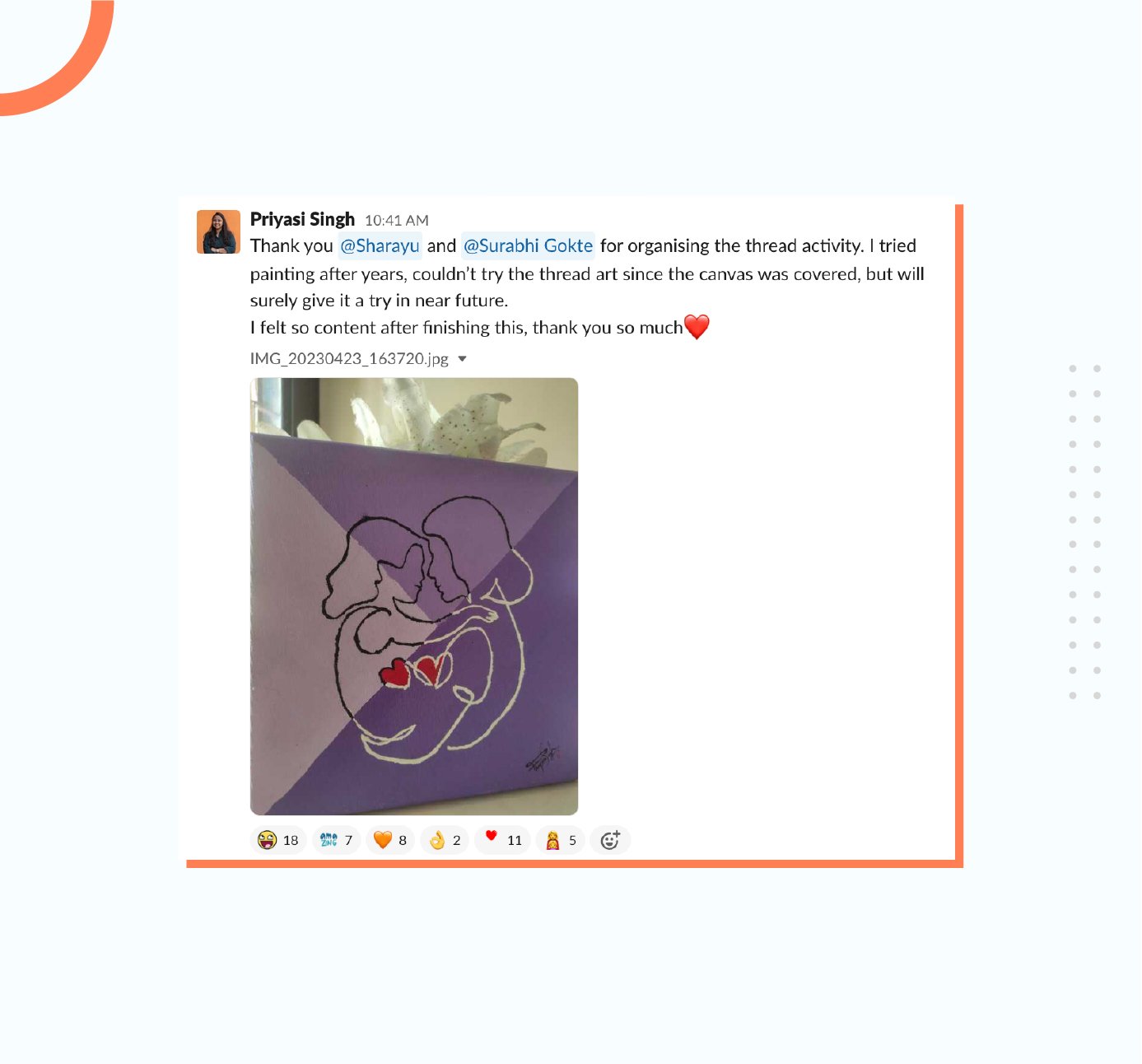
How Can You Grow Your Sage Powers And Tame The Saboteurs?
This is a 10-second sensing technique to activate the positive sage mind.
PQ reps toughen one's mental muscles through repeated practice—much like building physical muscles.
Over time, you can activate the sage powers at will, especially when your saboteurs hijack the mind.
To do a PQ rep, bring all your attention to one of our five senses—sight, touch, taste, hearing, or smell—and hold it for 10 seconds.
Initially, try to do it for 15 minutes daily, spread across the day in 10-second sessions.
And continue the practice for at least six to eight weeks, increasing the duration once you get accustomed.
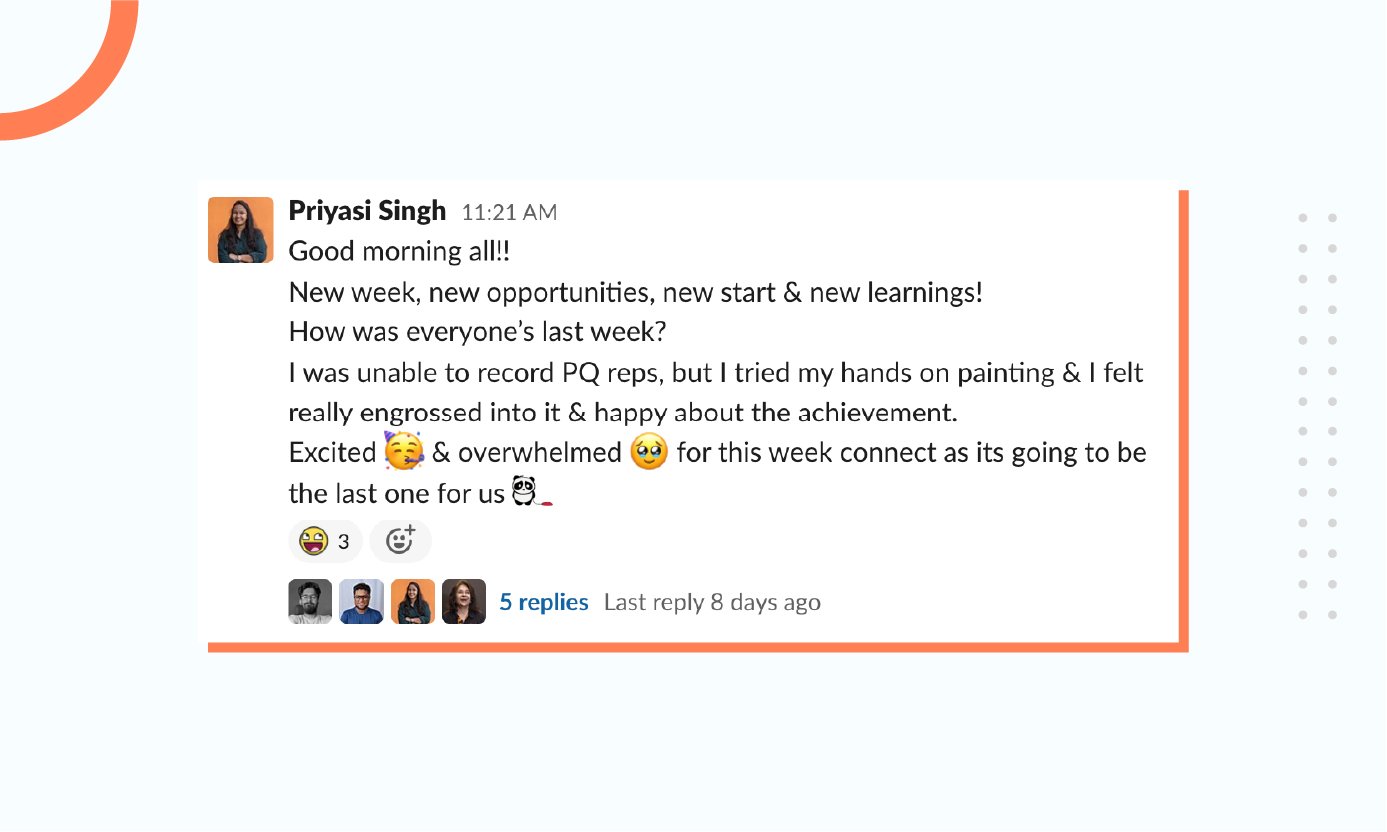
The aim is to do PQ reps in the middle of the hustle and bustle of daily life.
Let's Take The First Step Today
Growing up, most of us ingrain this belief that fear and pain are our friends. They keep us safe, away from harm.
But how long you stay in that state of fear and pain makes all the difference.
It's like keeping one's hand on a hot stove.
Without pain, our hand may incur third-degree burns by the time we realize what's happening.
The quicker we remove our hand, the lesser the burn.


Rohit Ganguly, Content Marketer
Rohit is a content marketer first and a YouTuber second. He loves to interact with animals, feed them, clean his apartment, and spend time with friends and family. Curious by nature, he also enjoys literature, movies, meditation, and calligraphy.

 We respect your privacy. Your information is safe.
We respect your privacy. Your information is safe.



Leave us a comment